Chinese-Led Beauty Brands Are Reclaiming the Traditions the Industry Has Long Appropriated
These companies honor the history of Traditional Chinese Medicine while catering to a global audience.
The beauty industry isn't exactly known for being the most respectful or original when "borrowing" beauty practices from other cultures. And while whitewashing, co-opting and profiting off of a minority community's traditions isn't exactly a new problem, the appropriation of East-Asian, specifically Chinese, beauty practices by white-owned and -founded brands has become particularly insidious in recent years.
Between white makeup artists and models popularizing the so-called "fox-eye" look, white influencers touting the benefits of gua sha and white-owned brands jumping on the bandwagon "trends" of jade rollers, healing crystals and facial-cupping devices, there are plenty of examples of the Western beauty industry's attempts to claim longstanding Chinese practices as their own, with little regard for their origins, provenance or even their correct usage. There's already been plenty of valuable discourse on the problematic nature of these "trends" and the ways in which white beauty and wellness founders and influencers have sought to profit off of Traditional Chinese Medicine (TCM) practices. But that shouldn't devalue the power of TCM itself. When practiced respectfully — and backed by founders who are of Chinese descent — these time-honored practices have a meaningful place in the present and future of the beauty and wellness industries.
To that end, an emerging group of Chinese-owned beauty brands is on a mission to reclaim Traditional Chinese Medicine practices and make them accessible to the masses. These brands are modernizing TCM in a genuine way, prioritizing honoring history and heritage while catering to a global consumer audience.
One such company is Lanshin, a beauty brand helmed by Sandra Lanshin Chiu, a licensed acupuncturist, herbalist, and TCM practitioner who also holds a Master of Science in Traditional Chinese Medicine. With a Brooklyn-based health studio and products such as facial massagers, scalp stimulators, sculpting spoons and gua sha, Chiu draws upon TCM to produce self-care tools her clients can learn to use at home and incorporate into their daily wellness routines.
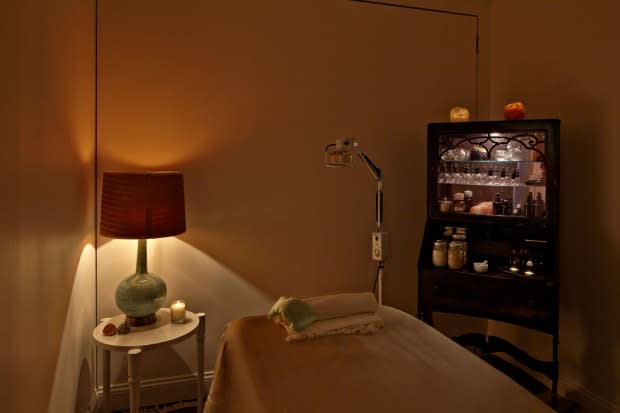
Photo: Courtesy of Lanshin
For Chiu, Chinese medicine fills a number of gaps Western medicine can't address. While Western treatments focus on managing existing and emerging symptoms, Chinese practices take a more preventative and holistic approach, she says. "Western medicine will treat dark circles and eye bags with tightening procedures and topical skin care, whereas in TCM we will also examine if there is weakness in the patient's kidney or liver energy system," says Chiu, for example.
Chiu is also frank about discussing the rampant cultural appropriation associated with TCM and the ways it has impacted her and her brand. "It's ironic that we have to work so hard to do this for practices that come from our culture... so many have reached out to us in tears of joy and relief to see an Asian face representing a practice that reminds them of their childhood," she says.
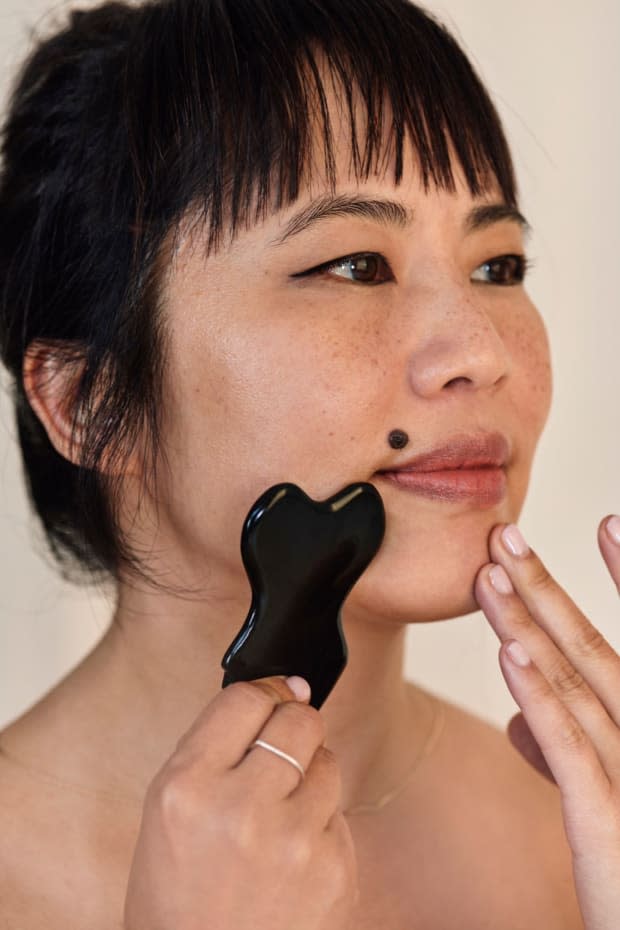
Photo: Courtesy of Lanshin
In her experience, the appropriation is not only cultural, but also professional. "Many overlook the fact that TCM is a serious medicine that you have to train for for four years in many states — the same length of time it takes to get through medical school," she explains. "If [someone doesn't] have an L.Ac. or D.Ac. behind their name, then they are not licensed to practice acupuncture and TCM modalities."
One of Lanshin's most popular items is its gua sha tool; gua sha is a Traditional Chinese Medicine practice that has been heavily Instgram-ified by influencers and white-owned brands over the past five years or so. Chiu relies on her own clinical and professional expertise to create effective tools rooted in Chinese tradition. The sculpting stones, made from natural sources such as nephrite jade and rose quartz, feature intentionally positioned curves, points and ridges to target areas with specific techniques that can even out skin tone and improve complexion.
Lanshin also incorporates education into its business model, offering detailed tutorials via its social media platforms. By consciously educating clients about the history and proper usage of TCM practices, Lanshin aims to connect users to the most authentic, accurate versions of them.
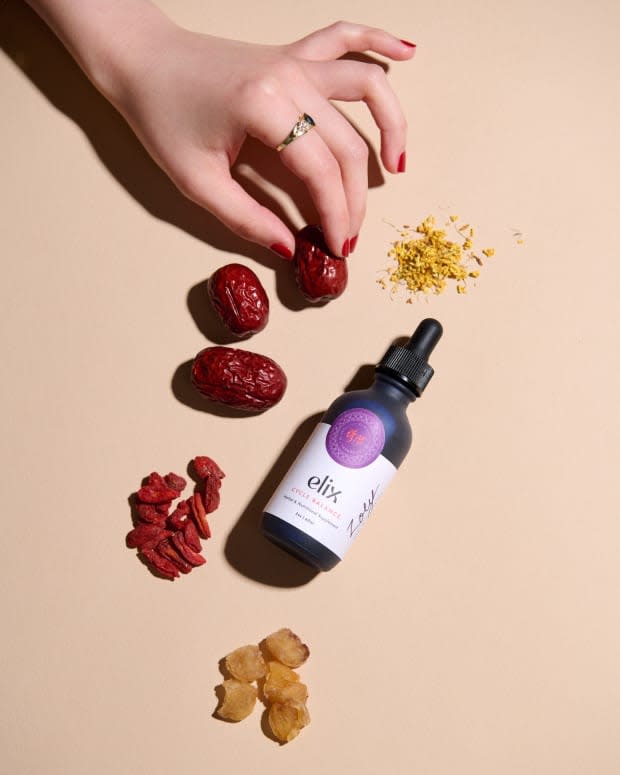
Photo: Courtesy of Elix
For Lulu Ge, founder of Elix — a company that delivers customized Chinese herbal remedies to ease women's hormonal health issues — the journey to practicing TCM was also personal. Ge's grandfather ran a hospital in China, so growing up, she witnessed firsthand how natural remedies like herbs, berries and botanicals can naturally support the body's healing. However, being raised in the United States, Ge felt frequently gaslit by medical providers regarding gynecology-related issues. On top of that, she notes that women's healthcare is vastly underfunded, and pain is often normalized within communities of color.
All of these experiences inspired Ge to found Elix, which taps into the traditional Chinese philosophy that the body is interconnected, with each part playing a crucial role in the health of the whole being. The brand's "healing journey" begins with one's period. "TCM views periods as a report card for your overall health," Ge explains. "Symptoms like painful and irregular periods, migraines, excessive bleeding with clots are vital signs of underlying imbalances that need attention."
Through an online health assessment asking patients about their menstrual and hormone symptoms, Elix creates custom herbal remedies tailored to individual needs. These formulas are based on ancient TCM remedies, made with organic and wild-harvested ingredients that have proven effective over hundreds of years and are also validated through modern clinical research.
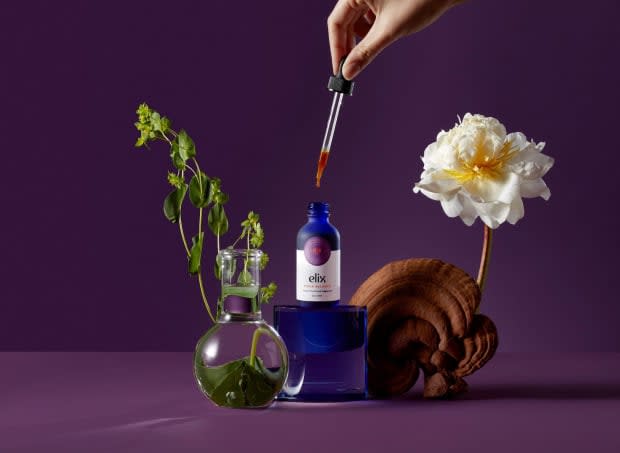
Photo: Courtesy of Elix
And the treatments have both skin-care and wellness-related benefits, notes Ge: "Once [our customers] are able to receive the support for their hormonal imbalances, their acne clears up, their skin looks more vibrant, their sleep is better, their eyes are brighter and they naturally feel more radiant from the inside out."
Skin care is the primary focus for TCM-powered brand Yina, which also incorporates Chinese medicinal herbs into its formulas. The brand offers a range of serums, face masks and cleansers spiked with custom-extracted versions of the herbs to promote skin health. For instance, Yina's Essential Mist is formulated from prebiotics, adaptogens and antioxidants that aid in promoting a healthy skin barrier and calming inflammation.
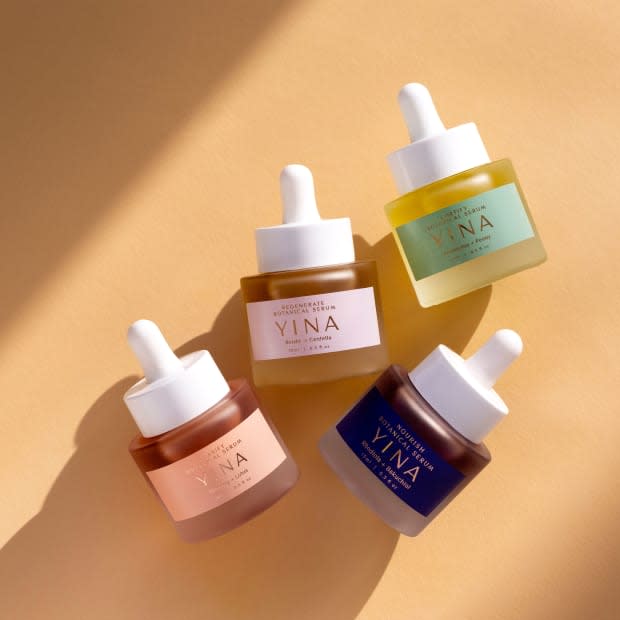
Photo: Courtesy of Yina
Yina's overall approach to skin care is also grounded in TCM philosophies: "Beauty is influenced by our daily habits, and various skin conditions are caused by an imbalance or blockage of our meridians," says Angela Chau Gray, Yina's COO (who is also a registered acupuncturist, herbalist and botanist). "This means taking a preventative approach to beauty, rather than a simply responsive steps," adds Ervina Wu, the company's CEO, who is also a registered TCM dermatologist.
An expert understanding of TCM traditions fuels Yina, which approaches skin-care with a level of expertise many other (white-owned) brands hawking gua sha sorely lack. "We are talking about these topics through the voice of practitioners and educators that have had extensive training and experience in TCM," says Gray. For instance, Yina promotes the gua sha massage practice not only for the face, but also for the body, which is in fact its original form of use — a fact that many Western brands and consumers buying into it might be unaware of.
While rampant cultural appropriation is something the beauty and wellness industries will likely continue to face, improving education and access to information can go a long way toward driving change. For consumers, investors and retailers looking to reap the benefits of a TCM-based approach to skin care and self care, the answer is pretty simple: Go straight to the source and choose brands created by TCM experts who have personal connections to Chinese culture.
Never miss the latest fashion industry news. Sign up for the Fashionista daily newsletter.
